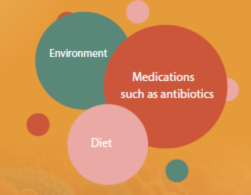
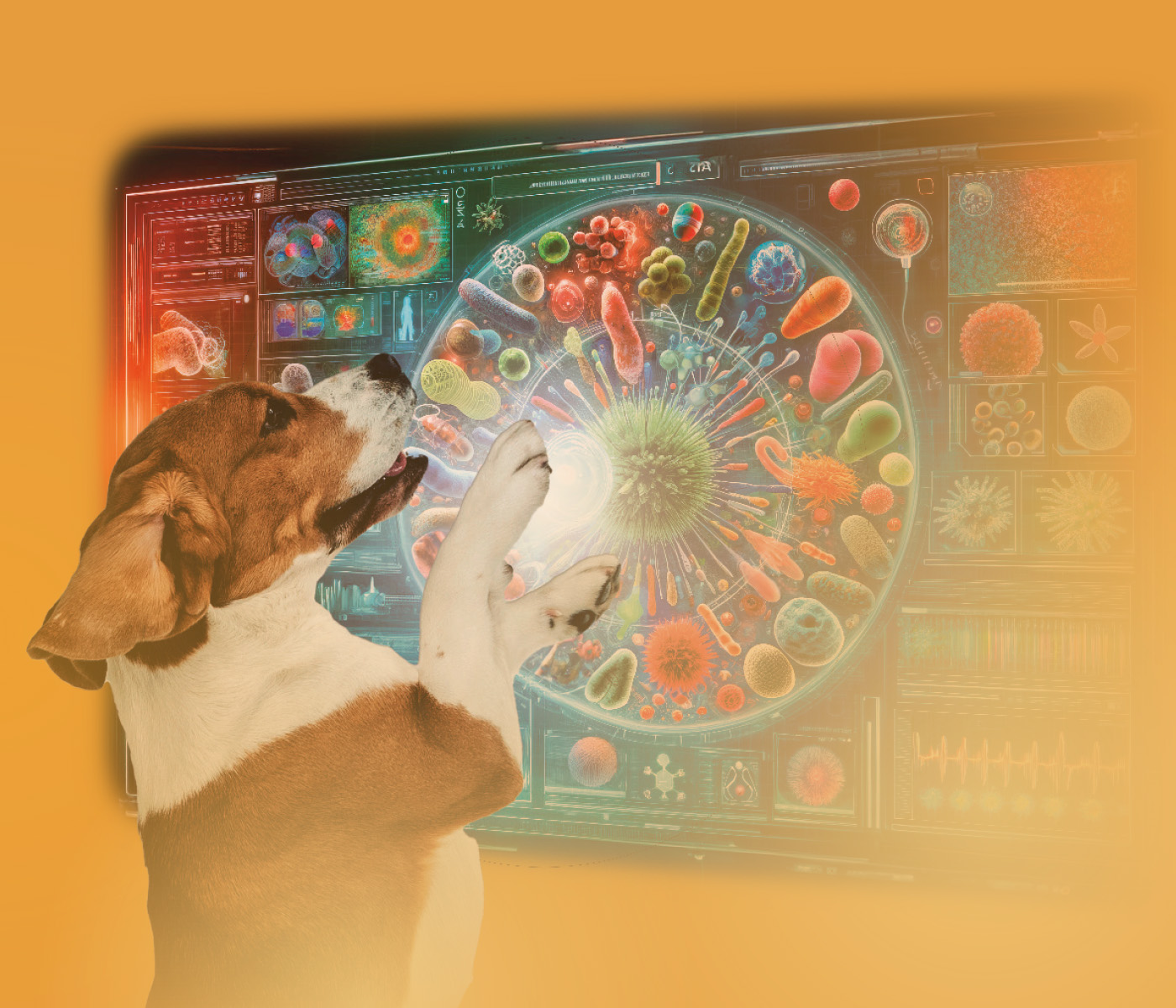 06 Aug 2024
06 Aug 2024
Intestinal Microbiota and its Modulation through Diet in Dogs
The gastrointestinal tract hosts a diverse microbiota, including bacteria, viruses, fungi, and protozoa (Suchodolski, 2021). This microscopic community plays a crucial role in the host’s bodily functions and maintaining homeostasis.
Each phylum has specific substrate preferences for fermentation, producing various metabolites that can have either beneficial or adverse effects.
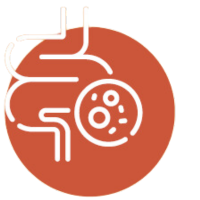 Beneficial metabolites from bacterial fermentation, like short-chain fatty acids (SCFA) and secondary bile acids, include trophic and anti-inflammatory effects on the intestinal mucosa.
Beneficial metabolites from bacterial fermentation, like short-chain fatty acids (SCFA) and secondary bile acids, include trophic and anti-inflammatory effects on the intestinal mucosa.
Conversely, some compounds, such as certain biogenic amines, ammonia, and phenols, can be toxic to the mucosa, harming the intestinal environment and interfering with fecal quality (Garrigues et al., 2022).
![]() The intestinal microbiota also contributes to the immune system by defending against non-resident intestinal pathogens (Suchodolski, 2011).
The intestinal microbiota also contributes to the immune system by defending against non-resident intestinal pathogens (Suchodolski, 2011).
When the microbiota is in balance (eubiosis), it positively impacts bodily functions, supporting the immune system (Arpaia et al., 2013; Suchodolski, 2016). However, this balance can be disrupted by various factors, such as:

(Schmidt et al., 2018; Vilson et al., 2018; Pilla et al., 2020)
The following sections will discuss the main bacteria related to canine intestinal health and how diet can aid in their modulation.
Sentinel Bacteria of the Gastrointestinal Tract
 [register] Changes in the microbiota that negatively impact the host are termed dysbiosis.
[register] Changes in the microbiota that negatively impact the host are termed dysbiosis.
Dysbiosis involves the modification and reduction of microbial diversity in the intestine, along with shifts in the proportions of certain microorganisms (Barko et al., 2017).
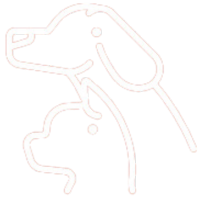 Recently, researchers at Texas A&M University developed a mathematical algorithm, based on qPCR analyses, to determine a dysbiosis index for dogs and cats. Recently, researchers at Texas A&M University developed a mathematical algorithm, based on qPCR analyses, to determine a dysbiosis index for dogs and cats. |
They identified 7 sentinel bacteria—microorganisms sensitive to changes in intestinal homeostasis—that can indicate whether a microbiome is in eubiosis or dysbiosis (Table 1).
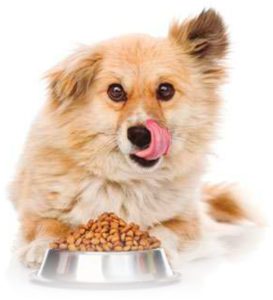 These are Faecalibacterium, Turicibacter, Escherichia coli, Streptococcus, Blautia, Fusobacterium, and Clostridium hiranonis (AlShawaqfeh et al., 2017).
These are Faecalibacterium, Turicibacter, Escherichia coli, Streptococcus, Blautia, Fusobacterium, and Clostridium hiranonis (AlShawaqfeh et al., 2017).
In healthy dogs, Faecalibacterium, Turicibacter, Blautia, Fusobacterium, and Clostridium hiranonis are increased, while Escherichia coli and Streptococcus are decreased.
In dogs with chronic enteropathy, the opposite is observed, with higher levels of Escherichia coli and Streptococcus.
Table 1: Sentinel Bacteria of the Gastrointestinal Tract and the Main Metabolites Produced
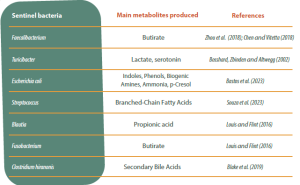
![]() Faecalibacterium significantly contributes to the production of butyrate, a metabolite that interacts with specific receptors to block pro-inflammatory T cell signaling, reducing intestinal inflammation (Zhou et al., 2018; Chen e Vitetta, 2018).
Faecalibacterium significantly contributes to the production of butyrate, a metabolite that interacts with specific receptors to block pro-inflammatory T cell signaling, reducing intestinal inflammation (Zhou et al., 2018; Chen e Vitetta, 2018).
Turicibacter, though producing minimal lactate (Bosshard, Zbinden, and Altwegg, 2002), plays an important role in regulating serotonin production in the intestine, aiding intestinal motility and highlighting the gut-brain axis link (Vedovato et al., 2015; Fung et al., 2019).
 Blautia fermentation produces propionic acid (Louis and Flint, 2016), which has anti-inflammatory and antioxidant properties by inhibiting the accessory protein CD14 (Hoyles et al., 2018).
Blautia fermentation produces propionic acid (Louis and Flint, 2016), which has anti-inflammatory and antioxidant properties by inhibiting the accessory protein CD14 (Hoyles et al., 2018).
Fusobacterium, although linked to colorectal cancer in humans (Goradel et al., 2018), is found in greater quantities in healthy dogs (Suchodolski et al., 2008; AlShawaqfeh et al., 2017).
Fusobacterium benefits from proteolytic fermentation, producing butyrate, which is an energy source for intestinal cells and has anti-inflammatory effects (Louis e Flint, 2016).
While some Clostridium species can be harmful (e.g., Clostridium difficile, Martin, Monaghan, and Wilcox, 2016), Clostridium hiranonis offers benefits.
Clostridium hiranonis converts primary bile acids into secondary bile acids (Blake et al., 2019), aiding in controlling Clostridium difficile (Buffie et al., 2014). The secondary bile acids produced by C. hiranonis also have anti-inflammatory effects in the intestine.
![]() Assim, a composição e diversidade da microbiota pode ser considerada um indicador de disbiose, sendo considerada um biomarcador importante da funcionalidade intestinal (Félix, et al., 2022).
Assim, a composição e diversidade da microbiota pode ser considerada um indicador de disbiose, sendo considerada um biomarcador importante da funcionalidade intestinal (Félix, et al., 2022).
Thus, microbiota composition and diversity are indicators of dysbiosis and important biomarkers of intestinal functionality (Félix et al., 2022).
Additionally, the metabolites produced, such as fecal concentrations of certain SCFAs, primary and secondary bile acids, and calprotectin, can be used as biomarkers of canine intestinal health.
Effect of Diet on Microbiota Modulation

Dietary ingredients can serve as substrates for the intestinal microbiome of dogs, significantly influencing its composition and metabolism.
![]()
Pet foods are formulated to provide essential nutritional components like carbohydrates, proteins, and fats, which, depending on their source and chemical composition, can impact the composition and function of the canine microbiome differently (Wernimont et al., 2020).
There is a growing trend to include ingredients aimed at modulating the intestinal microbiome, such as prebiotics and probiotics.
![]()
Researchers from the Canine Nutrition Studies Laboratory at the Federal University of Paraná (LENUCAN – UFPR) conducted studies on the impact of ingredients and additives on the microbiota of healthy Beagle dogs.
| Key ingredients, such as protein and fiber sources, show a significant ability to modulate the intestinal microbiota of dogs. |
In a study by Kaelle et al. (2023), high-protein dried distillers grains (HPDDG) showed beneficial effects on microbiota modulation, including reducing the genus Streptococcus.
Similarly, Souza et al. (2021) found that the modulation of canine intestinal microbiota varies with the type of fiber source used.
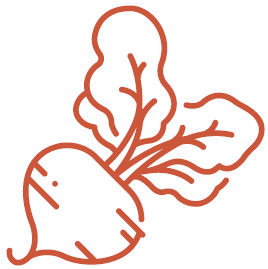
Soluble fiber sources, like beet pulp and cassava fiber, increased genera associated with eubiosis, such as Faecalibacterium and Blautia.
| Insoluble fibers, like cellulose, had a lower capacity to modulate the microbiota. |
 The group also studied the inclusion of additives, such as functional oils, prebiotics, and probiotics. Functional oils from plants have various health benefits for animals (Windisch et al., 2008).
The group also studied the inclusion of additives, such as functional oils, prebiotics, and probiotics. Functional oils from plants have various health benefits for animals (Windisch et al., 2008).
![]()
A study by Souza et al. (2023) on a blend of functional oils (copaiba oil, cashew nut oil, and pepper species) showed positive effects on fecal microbiota, inflammatory and oxidative responses in dogs under surgical stress.
These effects included a lower relative abundance of Streptococcus and lower serum levels of NF-kB (a nuclear factor related to inflammation).
![]()
The use of oregano essential oil combined with yeast cell wall improved microbiota diversity and reduced putrefactive compounds, such as phenols, leading to decreased fecal odor (Soares et al., 2023).
 Probiotic supplementation with Saccharomyces cerevisiae was also beneficial for the fecal microbiota of dogs undergoing abrupt dietary changes. Live yeast inclusion in the diet reduced E. coli presence, especially when paired with a higher-fiber, digestible protein diet (Bastos et al., 2023).
Probiotic supplementation with Saccharomyces cerevisiae was also beneficial for the fecal microbiota of dogs undergoing abrupt dietary changes. Live yeast inclusion in the diet reduced E. coli presence, especially when paired with a higher-fiber, digestible protein diet (Bastos et al., 2023).

Including Bacillus subtilis in the diet increased the diversity of beneficial genera like Faecalibacterium (Lima et al., 2020).
Additionally, this supplementation led to higher propionic acid levels and reduced fecal odor and nitrogen compounds, such as biogenic amines (Bastos et al., 2020).
Final considerations

The health of dogs is closely linked to the intestinal microbiota, whose composition and diversity are directly influenced by diet.
Diets with highly digestible proteins and soluble fibers improve the intestinal microbiome profile and its metabolites, increasing bacteria related to eubiosis and SCFAs while reducing potentially pathogenic bacteria and putrefactive compounds.
Moreover, diets enriched with additives like probiotics and functional oils can enhance eubiosis and the overall health and well-being of dogs.
References available upon request [/register]
Subscribe now to the technical magazine of animal nutrition
AUTHORS

Nutritional Interventions to Improve Fertility in Male Broiler Breeders
Edgar Oviedo
The Use of Organic Acids in Poultry: A Natural Path to Health and Productivity
M. Naeem
Synergistic Benefits of Prebiotics and Probiotics in Poultry, Swine, and Cattle
Gustavo Adolfo Quintana-Ospina
Hybrid Rye Potential in Laying Hen Feed Rations
Gwendolyn Jones
A day in the life of phosphorus in pigs: Part I
Rafael Duran Giménez-Rico
Use of enzymes in diets for ruminants
Braulio de la Calle Campos
Minerals and Hoof Health in the Pregnant Sow
Juan Gabriel Espino
Impact of Oxidized Fats on Swine Reproduction and Offspring
Maria Alejandra Perez Alvarado